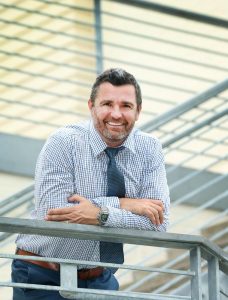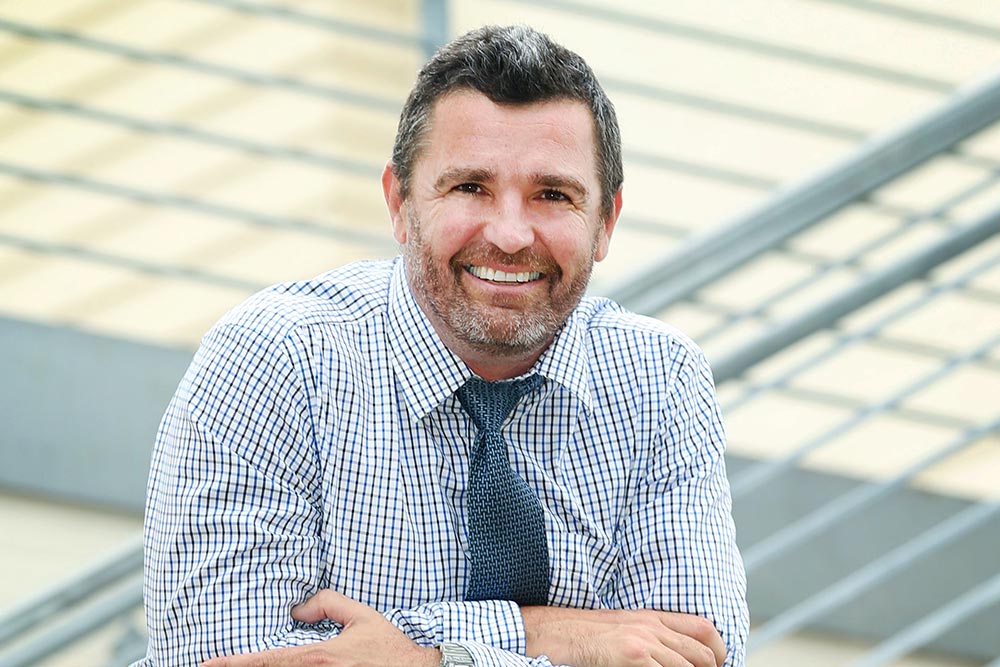He has served the impoverished at a fledgling urban clinic in Boston, cared for patients at a well-established medical center in San Francisco, and run a private practice in Maryland. But for family doctor specialist Ryan Gorman, DO, joining the Trinity Health of New England Medical Group at Saint Francis Hospital and Medical Center meant coming home.
Dr. Gorman grew up in Farmington and remained in the state to attend Wesleyan University. “Connecticut never really got out of me,” he says. “I like the people, the attitude, the liberal minds and diversity – I wanted my children to have the same experiences I had.”
Shortly after moving back to his hometown – before the coronavirus pandemic closed schools and prompted a call for residents to shelter in place – Dr. Gorman took his daughter to visit her new school. As he wandered the halls of the Farmington elementary school, which he also attended, he spotted his former principal, now retired, smiling down at him from a painting on the wall. “The school’s smell was the same, the playground was the same,” he says. “It’s great to have this connection with my daughter.”
From coast to coast

An American Studies major at Wesleyan, Dr. Gorman had planned on becoming a history teacher, although he says he fulfilled his pre-med requirements, as he hadn’t excluded an eventual career in medicine. After a brief stint as a substitute teacher back in Farmington, at Farmington High, he decided he wasn’t “a rule maker” – nor was he authoritative enough at age 21 to be teaching students who were only slightly younger than he was. He pivoted to medical school, where a rotation with a family medicine specialist piqued his interest in the field.
“The exciting thing about being a family doctor is that you are always learning: it is always increasing your knowledge base,” says Dr. Gorman. “This pandemic is a classic example of that – every day, I’ve been learning something new.”
Dr. Gorman earned his medical degree in 2003, finished his residency at Boston University, and was asked to stay on as a faculty member and serve as a family doctor at an understaffed urban clinic. A few years later, he moved across the country for a job at Kaiser Permanente in San Francisco, where he met his wife. After having their first child, they moved back to the East Coast to be closer to their families – and then had another. Dr. Gorman joined a family physician practice in Maryland, his wife’s home state, before coming to Connecticut in January to join the staff of Saint Francis.
Pandemic-inspired changes
Dr. Gorman initially worked out of his group’s Farmington office – then the pandemic hit, and changed everything. His office building was converted to one of Trinity Health of New England’s FURI (Fever Upper Respiratory Infection) clinics, facilities dedicated to assessing, treating and triaging patients who are experiencing potential COVID-19 symptoms. (The FURI clinics were established to keep people with symptoms of upper respiratory tract illnesses out of physician offices and the emergency room, to help limit the spread of disease among vulnerable populations.) Dr. Gorman was moved to Trinity Health’s West Hartford office “to do the primary care element of COVID.” He is part of the triage staff, he says.
“My role is to address the overflow and the non-COVID things as well,” he explains. “People still have diabetes, they still have high blood pressure, they still get rashes.” He also refers patients for testing at one of Trinity Health’s drive-through testing centers when he suspects novel coronavirus infection. The tentative date for his return to Farmington is early August.
Telemedicine in the age of COVID-19
The COVID-19 pandemic has prompted many doctors – Dr. Gorman included – to make a move to telemedicine, and he has embraced this new way of “seeing” patients, though he says that the video visit is definitely different from an in-person visit.
“You have to bring a new medical bag to the encounter,” he says. “You can’t really examine the patient but there are a lot of things you can see.” While doctors can’t listen to your lungs over the telephone, for example, they can still assess your respiratory rate, Dr. Gorman says. “You can watch patients and look at your watch and see how many times they breathe in a minute. Are they using accessory muscles to breathe – muscles in the neck or abdomen?”
The art of medicine, Dr. Gorman says, is really the medical history, which the doctor obtains by talking to patients and assessing their symptoms. “Ninety-five percent of the history you are taking will determine what’s going on – the exam just confirms that. In the age of coronavirus,” he says, “the video visit has been a godsend, because you don’t have to be face to face with a patient.”
While minimizing unnecessary exposures is in everyone’s best interests, both patients and providers, Dr. Gorman stresses that there is still a place for in-person visits. “If you’re really sick, having chest pain, shortness of breath, high blood sugars – we are here and so is the ER,” notes Dr. Gorman. “The video platform allows a buffer, a step in between to risk stratify and determine who needs to be seen and when they need to be seen.”
Though most routine doctor visits, preventive care, and elective procedures were put off in the earlier phases of the pandemic, Dr. Gorman says that as the state opens up, he anticipates people will be coming in again for routine physicals and immunizations. His practice, like most others across the region, has made changes designed to maximize patient (and health worker) safety.
“Our office doors are locked – there’s a message to call on arrival – and we are discouraging walk-ins,” Dr. Gorman says. “We’re limiting exposure to nurses and medical assistants, bringing patients directly to examining rooms, and both doctors and patients wear masks.”
It’s important, Dr. Gorman says, that patients don’t lose follow-up contact with their primary care physicians. “Kids will hopefully be returning to school in the fall and they need certain immunizations done,” he says. Adults, too, need to complete vaccination series that started before the pandemic. Men need prostate screenings, women need to get their mammograms, and patients with chronic conditions like heart disease and diabetes need to have their blood pressure and blood sugar monitored. “You need to keep your eye on the big picture,” Dr. Gorman says.
As a family doctor, Dr. Gorman is a big advocate of preventive health. “Prevention is the key for all my patients who are healthy and happy and living into their 80s and 90s,” he says.
“Exercise, healthy diet, not smoking, dealing with stress and anxiety – they greatly reduce the incidence of chronic disease.”
As for COVID-19, he says, since there is no cure, and everyone responds differently to the disease, it’s important to be proactive and avoid exposure. “Being the father of two children, I consider staying safe to be of the utmost importance,” he says. His advice to his patients: “Wear a mask, wash your hands, and stay away from sick people.”
Lori Miller Kase is a freelance writer living in Simsbury.
Stan Godlewski is an editorial, corporate and healthcare photographer based in Connecticut and working primarily between Boston and New York City.







More Stories
Winter Wellness: Simple Ways to Feel Your Best All Season
A Hallmark Movie Featuring Slightly Old Folks
Innovation and Dedication that Prioritizes Patient Care